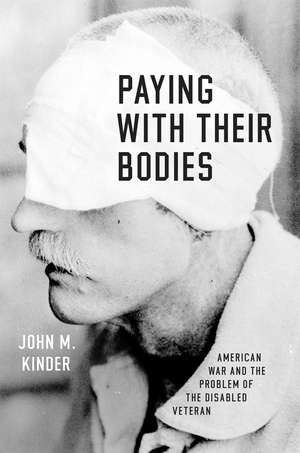Paying with Their Bodies: American War and the Problem of the Disabled Veteran
Autor John M. Kinderen Limba Engleză Paperback – 9 sep 2016
Christian Bagge, an Iraq War veteran, lost both his legs in a roadside bomb attack on his Humvee in 2006. Months after the accident, outfitted with sleek new prosthetic legs, he jogged alongside President Bush for a photo op at the White House. The photograph served many functions, one of them being to revive faith in an American martial ideal—that war could be fought without permanent casualties, and that innovative technology could easily repair war’s damage. When Bagge was awarded his Purple Heart, however, military officials asked him to wear pants to the ceremony, saying that photos of the event should be “soft on the eyes.” Defiant, Bagge wore shorts.
America has grappled with the questions posed by injured veterans since its founding, and with particular force since the early twentieth century: What are the nation’s obligations to those who fight in its name? And when does war’s legacy of disability outweigh the nation’s interests at home and abroad? In Paying with Their Bodies, John M. Kinder traces the complicated, intertwined histories of war and disability in modern America. Focusing in particular on the decades surrounding World War I, he argues that disabled veterans have long been at the center of two competing visions of American war: one that highlights the relative safety of US military intervention overseas; the other indelibly associating American war with injury, mutilation, and suffering. Kinder brings disabled veterans to the center of the American war story and shows that when we do so, the history of American war over the last century begins to look very different. War can no longer be seen as a discrete experience, easily left behind; rather, its human legacies are felt for decades.
The first book to examine the history of American warfare through the lens of its troubled legacy of injury and disability, Paying with Their Bodies will force us to think anew about war and its painful costs.
America has grappled with the questions posed by injured veterans since its founding, and with particular force since the early twentieth century: What are the nation’s obligations to those who fight in its name? And when does war’s legacy of disability outweigh the nation’s interests at home and abroad? In Paying with Their Bodies, John M. Kinder traces the complicated, intertwined histories of war and disability in modern America. Focusing in particular on the decades surrounding World War I, he argues that disabled veterans have long been at the center of two competing visions of American war: one that highlights the relative safety of US military intervention overseas; the other indelibly associating American war with injury, mutilation, and suffering. Kinder brings disabled veterans to the center of the American war story and shows that when we do so, the history of American war over the last century begins to look very different. War can no longer be seen as a discrete experience, easily left behind; rather, its human legacies are felt for decades.
The first book to examine the history of American warfare through the lens of its troubled legacy of injury and disability, Paying with Their Bodies will force us to think anew about war and its painful costs.
Preț: 182.19 lei
Nou
Puncte Express: 273
Preț estimativ în valută:
34.86€ • 36.50$ • 28.85£
34.86€ • 36.50$ • 28.85£
Carte tipărită la comandă
Livrare economică 05-19 aprilie
Preluare comenzi: 021 569.72.76
Specificații
ISBN-13: 9780226420714
ISBN-10: 022642071X
Pagini: 368
Ilustrații: 41 halftones, 3 line drawings, 1 table
Dimensiuni: 152 x 229 x 23 mm
Greutate: 0.49 kg
Ediția:1
Editura: University of Chicago Press
Colecția University of Chicago Press
ISBN-10: 022642071X
Pagini: 368
Ilustrații: 41 halftones, 3 line drawings, 1 table
Dimensiuni: 152 x 229 x 23 mm
Greutate: 0.49 kg
Ediția:1
Editura: University of Chicago Press
Colecția University of Chicago Press
Notă biografică
John M. Kinder is associate professor of American studies and history at Oklahoma State University.
Cuprins
List of Illustrations
Introduction
Part I. The Industrialization of Injury
Thomas H. Graham
1. “To Bind Up the Nation’s Wounds”: How the Disabled Veteran Became a Problem
Arthur Guy Empey
2. “The Horror for Which We Are Waiting”: Anxieties of Injury in World War I
Part II. The Aftermath of Battle
Elsie Ferguson in “Hero Land”
3. “Thinking Ahead of the Crippled Years”: Carrying On in an Age of Normalcy
Sunday at the Hippodrome
4. “The Cripple Ceases to Be”: The Rehabilitation Movement in Great War America
Part III. Mobilizing Injury
The Sweet Bill
5. “For the Living Dead I Work and Pray”: Veterans’ Groups and the Benefits of Buddyhood
Forget-Me-Not Day
6. “For the Mem’ry of Warriors Wracked with Pain”: Disabled Doughboys and American Memory
James M. Kirwin
7. “What Is Wrong with This Picture?” Disabled Veterans in Interwar Peace Culture
Part IV. Old Battles, New Wars
Harold Russell
8. “The Shining Plate of Prestige”: Disabled Veterans in the American Century
Tammy Duckworth
Epilogue: Toward a New Veteranology
Acknowledgments
Notes
Index
Introduction
Part I. The Industrialization of Injury
Thomas H. Graham
1. “To Bind Up the Nation’s Wounds”: How the Disabled Veteran Became a Problem
Arthur Guy Empey
2. “The Horror for Which We Are Waiting”: Anxieties of Injury in World War I
Part II. The Aftermath of Battle
Elsie Ferguson in “Hero Land”
3. “Thinking Ahead of the Crippled Years”: Carrying On in an Age of Normalcy
Sunday at the Hippodrome
4. “The Cripple Ceases to Be”: The Rehabilitation Movement in Great War America
Part III. Mobilizing Injury
The Sweet Bill
5. “For the Living Dead I Work and Pray”: Veterans’ Groups and the Benefits of Buddyhood
Forget-Me-Not Day
6. “For the Mem’ry of Warriors Wracked with Pain”: Disabled Doughboys and American Memory
James M. Kirwin
7. “What Is Wrong with This Picture?” Disabled Veterans in Interwar Peace Culture
Part IV. Old Battles, New Wars
Harold Russell
8. “The Shining Plate of Prestige”: Disabled Veterans in the American Century
Tammy Duckworth
Epilogue: Toward a New Veteranology
Acknowledgments
Notes
Index
Recenzii
“Kinder mixes in sketches of well-known disabled veterans—including Harold Russell (WWII), Ron Kovic (the Vietnam War), and Tammy Duckworth (the Iraq War)—with bigger-picture issues involving the social and political impacts of veterans’ disabilities. It’s a well-written, though academically tinged, tome that illuminates the long-lasting human legacy of America’s wars.”
“An unflinching look at the true cost of battlefield bloodshed. . . The sheer excellence of the writing and Kinder’s reliance on factual vignettes . . . give the text a sensuous immediacy. Kinder shies away from war pornography, but he refuses to gloss over the gruesome effects of battle. . . I was left at the end of Paying with Their Bodies with the gnawing question implicit in the book: Is it worth it? What have we gained by our wars that counterbalances the monstrous death and disfigurement inflicted? At what point do war’s dividends of destroyed bodies and minds outweigh the gains? Kinder leaves us to answer these questions for ourselves.”
“A valuable history. . . . Kinder’s concern is not the multiple problems of individual disabled vets, but the capitalized Problem they collectively present to U.S. policymakers. . . . Kinder focuses his book on World War I and hopes to elevate disabled veterans to the center of our thinking about warfare.”
“Kinder offers an impressive analysis. . . . Although much of the book centers on the years surrounding WW I, which Kinder views as pivotal in terms of how Americans viewed and employed the disabling effects of war, it draws important and useful comparisons to current day events as well. Kinder’s work is a fascinating and much-needed addition not only to disability history, but also to the history of war and US society. Highly recommended.”
“Kinder shows that the war-disabled have always been exploited for political purposes by isolationists, pacifists or conservatives seeking to influence American foreign policy.”
“Kinder convincingly shows the stubborn persistence of American discourses about disabled soldiers despite the extraordinary variations in the wars that produced those soldiers. He resists unduly flattening things out—things do change as the wars change. But anyone following discourses about the disabled of post-9/11 wars will find much that is familiar, and much that is powerful, in this account.”
"For the wounded soldier, the shadow of war extends long after the shooting stops. By placing the disabled soldier at the center of the history of American warfare since the Civil War, John M. Kinder has provided a disturbing and important account of this country’s engagement with war."
"We hear a lot about the 'human cost of war,' but Kinder’s book not only exposes us to its dismembering horror, but also asks us to follow disabled service-personnel back into the civilian world after the war, where they struggle to reinvent their lives. It is a compassionate account of terrible suffering, which many veterans don’t survive. The big question remains: why have we still not learnt the lesson of war?"
“Kinder has written a powerful and essential history of how disabled veterans came to be seen as a ‘problem.’ His unflinching accounts of battlefield injuries illuminate the social costs of war. The impact of disability—from Civil War amputations to World War I ‘shell shock’—was driven not only by changes over time in combat, but also by the way injuries were viewed at home. War injury was drawn upon in both pro- and anti-war political struggles, and scandals over veterans’ care periodically rocked Washington. Veterans organizations like the American Legion divided over whether veterans with disabilities needed paternal care or self-empowerment. Ultimately the ‘problem’ of disabled veterans went beyond the need for services. They embodied war’s ongoing impact, complicating cultural and political efforts to leave war behind. An important contribution.”
“Since the founding of the United States, veterans’ disability has been a vital, contested component of the nation’s public policy, a repercussion of its long history of war. In this commendable monograph, Kinder examines the medical, fiscal, and social consequences of veterans’ disability and their impact upon American militarism. . . . Drawing from the disciplinary traditions of American studies, he introduces readers to an impressive array of vivid primary sources. Teachers will find a wealth of instructional material—novels, magazine articles, photographs, posters, radio programs, plays, films, monuments, holidays—in his pages.”
“Paying with Their Bodies is a rich and timely examination of veterans and the extraordinary price they paid in the form of dismembered limbs, shredded flesh, and chronic pains that traveled with them from the trenches of Europe to the farmsteads of the heartland of America.”
“Kinder’s book is a benchmark for the study of war and disability. It has as much to do with the rehabilitation of the soldiers as it does about the ongoing rehabilitation of American society. He articulates the social and cultural constructions of the disabled veteran with clarity and gives the reader a sense of what is at stake for contemporary society. Paying With Their Bodies is a must read for any scholar interested in the First World War, American society, and disability history.”
“Paying with Their Bodies is a fascinating, elegantly written, and tightly argued book. What is more, it presents provocative arguments about the consequences of war.”
“Contrary to the hopeful predictions of the policymakers and their advisers who constructed the volunteer military, the civil–military divide has grown wider than at any other point in American history, at a time when America’s global military commitments have only grown larger. . . . Among his thoughtful, complicated answers to these questions, Kinder points to the relationship between the public and their military.”













